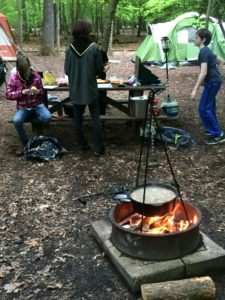Camping with Kids with Food Allergies
Outdoor Service Guides is all about inclusive scouting and making everyone feel welcome. One way my group works to be inclusive is in meal planning. My children have celiac disease, which means they cannot eat gluten or anything with wheat in it. My oldest had many situations where she was asked to bring her own food, or ate separately from the other kids before we started our OSG group. Even if she was having similar food, forcing her to have all separate food kept her apart from the other kids in a way that wasn’t inclusive. I didn’t want any child who was in my scouting group to feel like that ever again. As a result, we have made plans to feed our group to accommodate all food allergies, as best we can.
For your group, you will need to know what food allergies you need to accommodate. Some allergies are so dangerous, the entire group may need to abide by the restriction. Tree nut and peanut allergies are often like that. The more allergies and issues your group has, the more challenging it can be to figure out how to feed everyone.
Know Your Scouts Needs
It is important to understand the difference between levels of severity with food allergies and sensitivities. Allergies are typically categorized as conditions that trigger immune responses, such as a runny nose or swelling. Intestinal distress is also a sign of an allergy and is harder to recognize. Food sensitivities can cause mood changes, sleep disturbances, brain fog, and intestinal issues. And kids who typically avoid eating a specific food, even if they aren’t allergic or sensitive to it, may encounter these symptoms when they eat it. To make sure everyone has the best time possible on your trip, you want to respect allergies, sensitivities, and avoidances as much as is reasonable. Obviously serious allergies are to be prioritized, but a child spending the trip in the latrine because they aren’t used to eating meat is important to avoid too.
Another important part of planning meals for scouts with allergies is checking to see what they are actually going to want to eat ahead of time. Just because something accommodates a child’s allergies, that doesn’t mean they like it. Some “allergy-free” foods are not yummy. Food allergy parents are label readers and will understand their child’s allergies best. Ask for help so you don’t end up in a situation with hungry kids who can’t eat the food you cooked.
As a general rule, go for things that are single-ingredient, whole foods. Allergens can sneak into ingredient labels and be hard to recognize. Things that say “and other spices” could be a real problem for someone allergic to nightshades, the family of plants that include potatoes and tomatoes as well as chili powder and paprika.
Lunch
Lunch is the most common meal needed at scouts, as part of a camping trip, day hike, or other events. The easiest way to accommodate allergies for this is to ask everyone to bring a sack lunch. However, that isn’t always practical.

A sandwich bar can often accommodate a wide range of food allergies given a little thought. The general idea being that the kids can pick their own food and steer clear of things they cannot eat. A small variety of lunch meat and cheeses, along with peanut butter and jelly make up the bulk of the meal. Then you can round it out with some veggies and ranch dressing and some potato chips.
Kids with gluten/wheat allergies need to go through the line first so that nothing is contaminated by the bread everyone else uses. Even small particles can make them sick. So, let them get their gluten-free bread, meat, cheese, and jam first. This keeps cross-contamination from being an issue. If you are camping for multiple days and plan to serve sandwiches again, make sure to keep a portion of the food sealed and separate for the second meal, to guarantee it is not cross-contaminated.
If you choose to grill hot dogs or hamburgers for a meal, be sure to keep meat safe and far from any wheat/buns until after your gluten-free scouts have gotten theirs. Gluten-free buns can make this meal easy to accommodate more scouts.
You can also shop for chicken or turkey-based hot dogs for scouts who have allergies to mammal products, often caused by Alpha-Gal, a tick-borne disease. And cooking soy or meatless sausages is also an option for this meal.
My scout with Alpha-Gal also cannot eat foods with gelatin and most marshmallows are a no-go. So, we’ve had to think carefully about the food choices that we used to have often. Keep cross-contamination in mind. Vegetarian sausages and meat alternatives often contain soy and gluten and will need to be kept separate from or cooked after the food for the gluten-free children. It is possible to have what seems like competing allergies in your group and still feed everyone. It just takes some planning.
Dinner
 Dinner while camping can be challenging enough to figure out how to feed a large group. Throwing in food allergies can be hard. Here are some tried and true meals we have done.
Dinner while camping can be challenging enough to figure out how to feed a large group. Throwing in food allergies can be hard. Here are some tried and true meals we have done.
Tacos or Walking Tacos are great because scouts can each make their own, and add only what they like and can eat. You can serve with corn tortillas for wheat allergies, make it with turkey for beef allergies, or even offer heated refried beans for vegetarians. Cheese, also a common allergen, is easy to avoid with this meal, just have it available for scouts who can eat it, but not on everything. If you tend to use a seasoning packet, be sure to check it for allergens before cooking. Making your own spice blend is an easy way to avoid dubious ingredients like “natural flavorings” that can be a hidden allergen.
Chicken foil packets also work well to accommodate a wide range of tastes. Scouts can add vegetables, chicken, and seasoning to their foil packet and cook in the coals until done. We like to offer interesting seasoning choices like salad dressings and jam, too. This meal lets each scout customize their meal so that no one feels left out. Food allergies are less obvious, as each scout builds their unique meal. If your group is large, have scouts write their names on the foil packets with sharpie before cooking.
Beef Stew or Chili are foods that can feed a large group and accommodate many food allergies. Just be sure to not add flour as a thickener if your scouts are gluten-free. If you add pre-made bullion cubes or broth, that also needs to be checked for allergens. Vegetarian chili is another good option to feed scouts with food allergies, and there are many recipes to choose from.
Breakfast
 A hot breakfast is also possible with food allergies. Here are some of our favorites.
A hot breakfast is also possible with food allergies. Here are some of our favorites.
Oatmeal works with most food allergies. If scouts have celiac, make sure the package is marked gluten-free. Flavored varieties can also add allergies you may not expect, so consider bringing safe toppings like sugar, raisins, and honey and skipping the flavored varieties.
Scrambled Eggs are a crowd favorite. Make sure to leave out the milk or cheese to accommodate dairy allergies.
Sausage also works for most scouts. If you have vegetarians or vegans, sausage substitutes can be used so that those scouts don’t stand out. Just remember to check for competing allergies as some sausage substitutes contain wheat or dairy. For letting scouts cook, I prefer to get the precooked kind, so they just need to heat and eat.
Fresh Fruit can be part of any snack or meal and is typically low-allergy. A bag of apples and a few bunches of grapes are part of almost every trip we take.
Cleaning Up
Keep in mind that some scouts have food allergies severe enough that it may mean they have to avoid touching certain foods, and that includes doing dishes. Dishes for scouts with food allergies may need to be washed first, so they can’t be contaminated by food crumbs on the plates of other scouts. Plan your camp chores accordingly, encouraging scouts with allergies to start eating first, and start cleaning their dishes first. If your scout with food allergies needs to be left out of the dishwashing chores, make sure they have other camp chores to do that are safe for them.
Emergencies
If any of your scouts use an EpiPen or may need medication for allergies while camping, be sure all scout leaders know what proper procedure is for that situation before you go and where the medication will be stored during the trip. Always be prepared.
